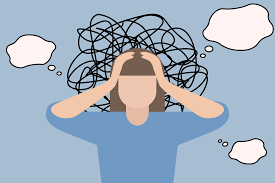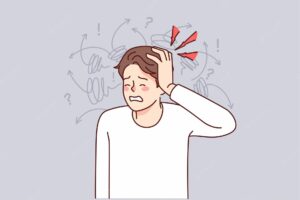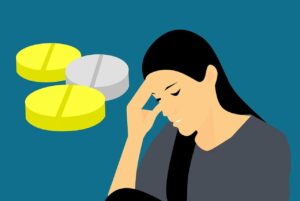Anxiety headaches are a type of headache that is caused by stress and anxiety. They can be very painful and debilitating, and can significantly affect your quality of life. If you are suffering from anxiety headaches, it is important to get treatment right away. In this article, we will discuss the causes of anxiety headaches, the symptoms, and how to treat them. We will also provide some helpful tips for preventing them in the future.
Contents
What Are Anxiety Headaches?
 We are no strangers to either anxiety or headaches. Both these conditions are very common, and often occur together. Anxiety is defined as an emotion characterized by feelings of tension, worry, and nervousness. Headaches, on the other hand, are one of the most common medical conditions in the world. According to the World Health Organization (WHO), headaches are experienced by nearly half of all adults each year.
We are no strangers to either anxiety or headaches. Both these conditions are very common, and often occur together. Anxiety is defined as an emotion characterized by feelings of tension, worry, and nervousness. Headaches, on the other hand, are one of the most common medical conditions in the world. According to the World Health Organization (WHO), headaches are experienced by nearly half of all adults each year.
The repercussions of anxiety on headaches are complicated. There are various theories on how anxiety can cause headaches. One theory suggests that anxiety increases the tension in the muscles of the head and neck, which leads to headaches. Another theory suggests that anxiety can trigger the release of certain chemicals in the brain, which can cause inflammation and pain. Regardless of the exact mechanism, it is clear that anxiety and headaches are closely linked.
Anxiety headaches can be very painful and debilitating. They are often described as a dull, throbbing pain that is felt on both sides of the head. The pain is often worse in the morning and can get worse throughout the day.
What Causes Anxiety Headaches?
There are many different causes of anxiety headaches. Some of the most common include:
- Stress: Stress is a very common trigger for anxiety headaches. When you are under a lot of stress, your body goes into fight-or-flight mode. This means that your body releases adrenaline and other stress hormones, which can lead to increased blood pressure and tension in the muscles. This can ultimately lead to a headache.
- Anxiety: Anxiety is another common trigger for anxiety headaches. When you are anxious, your body goes into fight-or-flight mode and releases stress hormones. This can lead to increased blood pressure and tension in the muscles, which can ultimately lead to a headache.
- Having other health conditions: Our bodies and mind are not separate entities. They are intimately connected, and our physical health can have a significant impact on our mental health. Conditions such as sleep disorders, thyroid problems, and low blood sugar can all trigger anxiety headaches.
- Depression: Depression is a common cause of anxiety headaches. When you are depressed, you may have increased levels of stress and anxiety. This can lead to increased blood pressure and tension in the muscles, which can ultimately lead to a headache.
- Sleep deprivation: Sleep deprivation is another common trigger for anxiety headaches. When you are not getting enough sleep, your body is not able to properly rest and repair itself. This can lead to increased levels of stress and anxiety, which can ultimately lead to a headache.
- Hormone imbalance: Hormone imbalances can also be a trigger for anxiety headaches. When your hormones are out of balance, it can lead to increased levels of stress and anxiety. Some neurotransmitters like serotonin and dopamine can also be affected by hormone imbalances. This can also lead to a headache.
All these are the possible explanations behind having anxiety headaches. It is possible that one might face one or more of these causes. However, the good news is that there are many different treatment options available.
How To Recognize The Signs Of An Anxiety Headache?
 How does one know whether the headache is because of anxiety? There are some specific characteristics of an anxiety headache. They include:
How does one know whether the headache is because of anxiety? There are some specific characteristics of an anxiety headache. They include:
- Tension headaches: This is the most common type of anxiety headache. Tension headaches usually feel like a dull, throbbing pain on both sides of the head. The pain is often described as being similar to a tight band around the head.
- Migraine headaches: Migraine headaches are a more severe type of headache that can be accompanied by nausea, vomiting, and sensitivity to light and sound.
- Cluster headaches: Cluster headaches are a rare type of headache that tends to occur in groups or clusters. They are often very severe and can last for several weeks at a time.
When one experiences anxiety, there might be a feeling of tightness or pressure in the chest. There might also be shortness of breath, sweating, and an increased heart rate. One might feel like they are having a heart attack. These are all signs that one is experiencing an anxiety headache. This can be confused with any of the three types of headaches mentioned above.
Anxiety headaches can be very debilitating.
How Are Anxiety Headaches Different?
A typical headache is different from an anxiety headache in a number of ways.
- First, anxiety headaches are often much more severe and debilitating than typical headaches. They can last for several hours or even days.
- Secondly, anxiety headaches tend to be accompanied by other symptoms such as nausea, vomiting, and sensitivity to light and sound.
- Finally, anxiety headaches often occur in groups or clusters. This implies that they are not just isolated incidents, but rather part of a larger pattern.
These are all characteristics that can help to distinguish an anxiety headache from a typical headache.
What Other Conditions Cause Headaches?
Headaches are one of the most common health complaints. They can be caused by a wide variety of conditions, including:
- Sleep disorders: Sleep disorders such as insomnia can often lead to headaches. This is because when you are not getting enough sleep, your body is not able to properly rest and repair itself.
- Tension: Tension headaches are the most common type of headache. They are often caused by muscle tension or stress.
- Migraine: Migraine headaches are a more severe type of headache that can be accompanied by nausea, vomiting, and sensitivity to light and sound.
- Weather changes: Changes in weather can also trigger headaches. This is most commonly due to changes in barometric pressure.
- Caffeine intake: Caffeine can both cause and relieve headaches. If you consume too much caffeine, it can lead to headaches. However, if you are withdrawing from caffeine, it can also cause headaches.
- Dehydration: Dehydration can also cause headaches. This is because when your body is dehydrated, it cannot function properly.
- Strain: Straining your eyes can often lead to headaches. This is because your eyes are not able to properly rest when they are strained.
- Fatigue: Fatigue can also cause headaches. This is because when you are tired, your body is not able to properly function.
As you can see, there are many different causes of anxiety headaches. If you suffer from anxiety headaches, it is important to talk to your doctor to determine the best course of treatment for you.
What Are The Consequences?
Anxiety is a psychological condition, meanwhile, headaches are primarily physical. When combined together, it is a sure-shot recipe for disaster. Anxiety headaches can have far-reaching consequences on an individual’s quality of life. It can not only impact their personal and professional life but also damage their relationships beyond repair.
Anxiety headaches can be so debilitating that they can make it difficult for a person to carry out even the most mundane tasks of daily living. The chronic nature of these headaches can make a person feel isolated and alone. In some cases, it can even lead to depression.
Moreover, our bodies also react to anxiety in different ways. For some, it can manifest as physical effects such as:
- sweating
- trembling
- increased heart rate
- pains and aches
- ulcers
- weight fluctuations
- stomach issues
- muscle tension
- dry mouth
- nausea
These physical reactions can further aggravate the headache and make the person feel even more anxious. In some cases, it can even lead to a full-blown panic attack. If you suffer from anxiety headaches, it is important to seek professional help.
How To Manage Anxiety Headaches?
 Fortunately, there are a number of ways to manage anxiety headaches. Some of the most effective methods include:
Fortunately, there are a number of ways to manage anxiety headaches. Some of the most effective methods include:
Relaxation techniques: There are a number of relaxation techniques that can help you manage anxiety headaches. These include:
- yoga
- meditation
- breathing exercises
- progressive muscle relaxation
- massage therapy
- acupuncture
- biofeedback
- aromatherapy
Therapy: Therapy is the process of working with a trained mental health professional to identify and address the root cause of your anxiety. It can be an extremely effective way to manage anxiety headaches. Some of the most common types of therapy include:
- cognitive-behavioral therapy
- interpersonal therapy
- family therapy
- group therapy
Medications: In some cases, medications may be necessary to manage anxiety headaches. These include:
- antidepressants
- anti-anxiety medications
- beta-blockers
- pain relievers
Home remedies: At times, someone may not want to or be able to take medication. Fortunately, there are a number of home remedies that can help manage anxiety headaches. These include:
- essential oils
- temperature therapy
- nutrition and diet changes
- sleep hygiene
- herbal teas
- acupressure
- relaxation apps
- exercise
If you suffer from anxiety headaches, it is important to seek professional help. There are a number of effective treatments available that can help you manage your symptoms and improve your quality of life.
Conclusion
To conclude our blog post, anxiety headaches can have far-reaching consequences on an individual’s quality of life. There are a number of effective treatments available that can help you manage your symptoms and improve your health. If you suffer from anxiety headaches, it is important to seek professional help.
If you or someone you know is looking for psychological help, Therapy Mantra is here for you. We are the leading providers of online therapy and counseling. Our team of highly trained and experienced therapists can provide assistance at the most affordable rates. Contact us today to learn more about our services. You may also visit our website to book an online therapy session or download our free Android or iOS app for more information.


